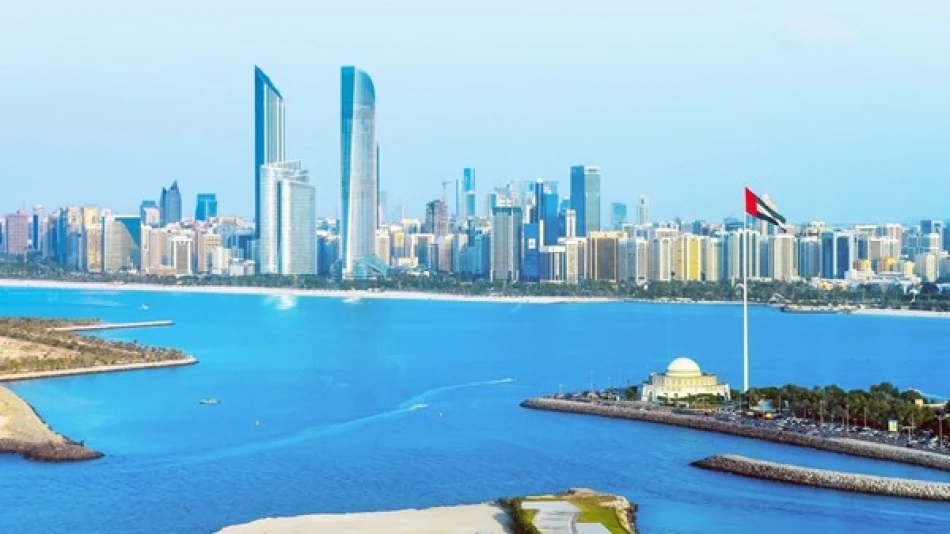
UAE's Non-Oil Sector Experiences Robust 5.3% Growth in Q1, Driving Economic Momentum
UAE's Economic Diversification Hits Historic Milestone as Non-Oil Sectors Drive Growth
The UAE has achieved a landmark economic milestone, with non-oil activities contributing a record 77.3% to its real GDP for the first time in the nation's history. This breakthrough signals the Gulf state's successful pivot away from oil dependency, positioning it as a regional leader in economic diversification amid global energy transitions and geopolitical uncertainties.
Strong Q1 Performance Across All Sectors
The UAE's real GDP expanded by 3.9% in the first quarter of 2025, reaching AED 455 billion compared to the same period in 2024. More significantly, non-oil GDP surged by 5.3% to AED 352 billion, demonstrating the robustness of the country's diversified economic base.
Abdullah bin Touq Al Marri, Minister of Economy and Tourism, emphasized that these preliminary figures from the Federal Competitiveness and Statistics Centre confirm the resilience of the national economy and validate the UAE's comprehensive development model. The performance reflects growing international investor confidence in the UAE's business environment, which has become a global benchmark for advanced economic policies.
Manufacturing and Financial Services Lead Growth Surge
Manufacturing industries topped all economic activities with impressive 7.7% growth during the first quarter, followed closely by finance, insurance, construction, and building sectors, each achieving 7.0% growth. Real estate activities expanded by 6.6%, while trade grew by a more modest 3.0%.
In terms of contribution to non-oil GDP, trade maintained its position as the largest sector at 15.6%, followed by finance and insurance at 14.6%. Manufacturing contributed 13.4%, construction and building added 12.0%, while real estate activities accounted for 7.4%.
Strategic Vision 2031 Gains Momentum
The achievement of 77.3% non-oil contribution represents a crucial step toward the UAE's "We the UAE 2031" vision, which aims to increase the country's GDP to AED 3 trillion by the next decade. This ambitious target requires sustained growth across knowledge-based and innovation-driven sectors.
Hanan Mansour Ahli, Director of the Federal Competitiveness and Statistics Centre, noted that the over 5% growth in non-oil GDP reflects the UAE's commitment to establishing an advanced, diversified economic model powered by technology and innovation.
Regional Leadership in Economic Transformation
The UAE's diversification success contrasts sharply with other Gulf economies that remain heavily dependent on hydrocarbon revenues. While Saudi Arabia pursues its Vision 2030 diversification agenda and Qatar leverages its World Cup infrastructure investments, the UAE has already achieved what many oil-dependent economies aspire to accomplish.
This transformation mirrors successful diversification models seen in Singapore and Hong Kong, where strategic positioning, business-friendly regulations, and infrastructure investments created sustainable economic ecosystems beyond natural resource extraction.
Investment Implications and Market Outlook
For investors, the UAE's economic structure now offers reduced exposure to oil price volatility while maintaining the benefits of a resource-rich economy. The strong performance in manufacturing and financial services suggests the country is successfully building industrial capacity and establishing itself as a regional financial hub.
The robust construction sector growth indicates continued infrastructure development and real estate demand, while the steady trade sector performance reinforces the UAE's position as a global logistics and commercial gateway between East and West.
The milestone achievement of 77.3% non-oil GDP contribution positions the UAE as the most economically diversified nation in the Gulf region, offering a template for other resource-dependent economies seeking sustainable growth models in an increasingly uncertain global energy landscape.
Most Viewed News

 Layla Al Mansoori
Layla Al Mansoori






